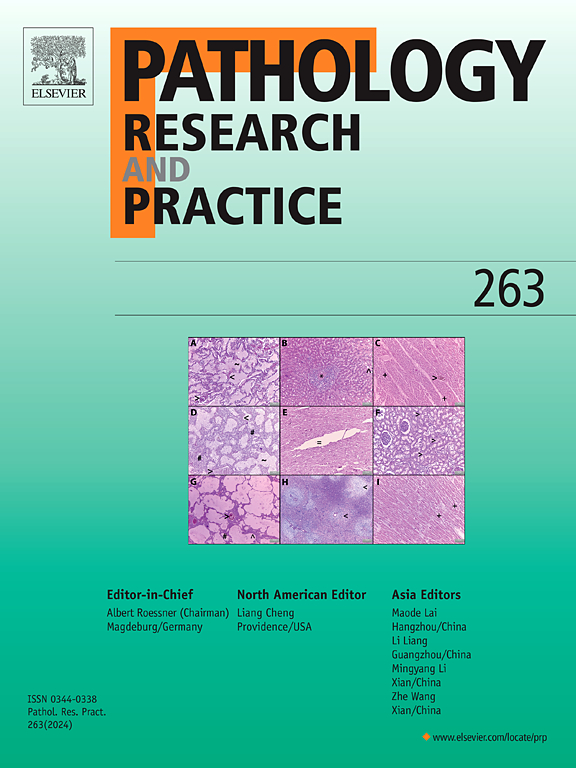Lycorine ameliorates astrocytic apoptosis and inflammation in cerebral ischemia/reperfusion injury via inhibiting mitochondrial dysfunction via SIRT1-mediated SIRT3/PRDX3 activation
IF 3.2
4区 医学
Q2 PATHOLOGY
引用次数: 0
Abstract
Lycorine (LYC) exerts anti-inflammation, antioxidation, and anti-apoptosis effects on many diseases. However, its impact on cerebral ischemia/reperfusion injury (CI/RI) has not been comprehensively examined yet. Using a murine model of middle cerebral artery occlusion/reperfusion (MCAO/R), we found that LYC administration significantly reduced neurological deficits, cerebral infarction, and cerebral edema, and provided long-term benefits in MCAO/R mice. In vitro studies using oxygen-glucose deprivation/reoxygenation (OGD/R)-induced primary astrocytes demonstrated that LYC enhanced cell viability while simultaneously reducing inflammation and apoptosis. Besides, LYC also alleviated OGD/R-induced mitochondrial dysfunction. Further analysis revealed that LYC enhanced SIRT3-mediated deacetylation of peroxiredoxin 3 (PRDX3), which is crucial for mitochondrial protection. SIRT3 inhibition with 3-TYP or shRNA significantly hindered PRDX3 deacetylation and abated the beneficial effects of LYC on OGD/R-induced astrocytes. Intriguingly, LYC increased SIRT1 expression and activity. Furthermore, the promoting effects of LYC on the deacetylation of PRDX3 mediated by SIRT3, as well as its protective capabilities against OGD/R-induced mitochondrial dysfunction, apoptosis, and inflammation in astrocytes, were abrogated by SIRT1 inhibition with EX527. These results indicate that LYC safeguards against CI/RI-induced apoptosis and inflammation in astrocytes by enhancing mitochondrial function via the SIRT1/SIRT3/PRDX3 pathway.
石蒜碱通过sirt1介导的SIRT3/PRDX3激活抑制线粒体功能障碍,改善脑缺血/再灌注损伤的星形细胞凋亡和炎症
石蒜碱(LYC)对多种疾病具有抗炎、抗氧化、抗细胞凋亡等作用。然而,其对脑缺血再灌注损伤(CI/RI)的影响尚未得到全面的研究。通过小鼠大脑中动脉闭塞/再灌注(MCAO/R)模型,我们发现给药LYC可显著减少MCAO/R小鼠的神经功能缺损、脑梗死和脑水肿,并提供长期益处。体外对氧葡萄糖剥夺/再氧化(OGD/R)诱导的原代星形胶质细胞的研究表明,LYC增强了细胞活力,同时减少了炎症和凋亡。此外,LYC还能减轻OGD/ r诱导的线粒体功能障碍。进一步的分析表明,LYC增强了sirt3介导的过氧化物还氧蛋白3 (PRDX3)的去乙酰化,这对线粒体保护至关重要。用3-TYP或shRNA抑制SIRT3显著阻碍PRDX3去乙酰化,减弱LYC对OGD/ r诱导的星形细胞的有益作用。有趣的是,LYC增加了SIRT1的表达和活性。此外,LYC对SIRT3介导的PRDX3去乙酰化的促进作用,以及其对OGD/ r诱导的星形胶质细胞线粒体功能障碍、凋亡和炎症的保护作用,被EX527抑制SIRT1所抵消。这些结果表明,LYC通过SIRT1/SIRT3/PRDX3通路增强线粒体功能,保护CI/ ri诱导的星形胶质细胞凋亡和炎症。
本文章由计算机程序翻译,如有差异,请以英文原文为准。
求助全文
约1分钟内获得全文
求助全文
来源期刊
CiteScore
5.00
自引率
3.60%
发文量
405
审稿时长
24 days
期刊介绍:
Pathology, Research and Practice provides accessible coverage of the most recent developments across the entire field of pathology: Reviews focus on recent progress in pathology, while Comments look at interesting current problems and at hypotheses for future developments in pathology. Original Papers present novel findings on all aspects of general, anatomic and molecular pathology. Rapid Communications inform readers on preliminary findings that may be relevant for further studies and need to be communicated quickly. Teaching Cases look at new aspects or special diagnostic problems of diseases and at case reports relevant for the pathologist''s practice.

 求助内容:
求助内容: 应助结果提醒方式:
应助结果提醒方式:


